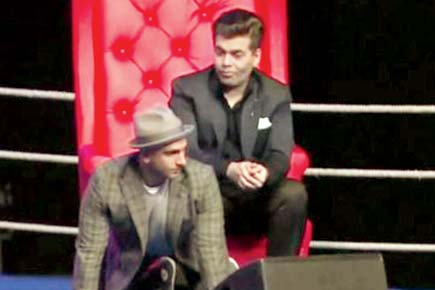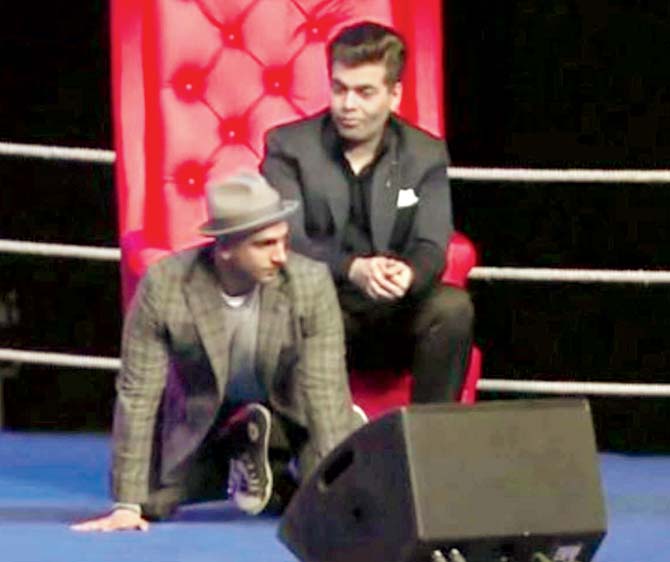Why is mainstream filmmaker Karan Johar admitting to his sexual orientation, even if in the form of a non-admission, so significant?


Johar has repeatedly made jokes on his sexual orientation in the past, often on his chat show, but chiefly in the infamous AIB ‘Roast’ (2015)
 “Everybody knows what my sexual orientation is. I don’t need to scream it out; I won’t, only because I live in a country where I could possibly be jailed for saying this. Which is why I, Karan Johar, will not say the three words that possibly everybody knows about me.”
“Everybody knows what my sexual orientation is. I don’t need to scream it out; I won’t, only because I live in a country where I could possibly be jailed for saying this. Which is why I, Karan Johar, will not say the three words that possibly everybody knows about me.”
What is so significant about this confession in the form of a non-confession to merit the front page of the Sunday Times of India? It’s an excerpt from the filmmaker Karan Johar’s forthcoming memoir, An Unsuitable Boy.
I’m thinking along with you, and please help me out here. I suspect this is the first time that a very national, mainstream public figure in India has jumped off the closet of shame, come out in the open, and said, without quite saying the three words, “I am gay.”
I don’t know what this does to the gay-rights movement. Or to millions of regular folks ‘cruising’ (as the community term goes), often in the dark, in public parks, men’s toilets, winding alleys, secretly looking to find companionship, or sex — I’m sure the Internet, in particular the popular app Grindr, has made accessing either, or both, a whole lot easier.
Also read: LGBTQ community hits out at Bollywood filmmaker Karan Johar
And yet, there’s that unsure teenager in a small town, or even a middle-aged married man, suffering within a conspiracy of silence, with his head screaming out loud that the world is not what it is, and he can still not confess this, even to himself sometimes, let alone friends, family or a society, that simply won’t accept him for who he is.
I think he’ll seek some solace in the fact that there’s someone right up there, who wakes up to “at least 200 hate tweets daily saying things like, ‘Get out, you’re polluting our nation, you’re dirtying our society,” willing to proudly declare and embrace his sexual orientation still, for whoever cares to read, or troll.
He belongs to a profession where, until not so long ago, people even briefly hid the fact that they were married (Govinda, Aamir), for fear of losing out on a potential fan base.
It helps further that Johar is possibly the most loved figure in Bollywood, an unassuming chatter-box who wears his fame rather lightly; wholly entrenched in every possible ‘camp’, from top stars (Shah Rukh, Salman, Aamir, Akshay), to the artsy-indie (Anurag Kashyap et al.).
Whether he’s homosexual, heterosexual, bi-sexual, ‘try-sexual’ (repeatedly trying for sex) is at best a fairly minor aspect of his identity. This is the sort of mainstreaming that normalises a taboo, and greatly benefits any marginalised, ghettoised community.
Johar has repeatedly made jokes on his sexual orientation in the past, often on his chat show, but chiefly in the infamous AIB ‘Roast’ (2015), the finest piece of unpretentious, popular entertainment that Bollywood ever curated. In 2008, Johar produced Dostana, a comedy centred on the fact that Abhishek Bachchan and John Abraham in the film could be gay. I really couldn’t tell what was funny about that.
Yet the song ‘Maa da ladla,’ about a hyperventilating mother assuming that her son being gay could be some sort of a correctible cosmic aberration was pretty much perceived as funny by all. And that says a lot for a homophobic society that pretends that there are no gay people in their midst (least of all in their families) even as Ashok Row Kavi, editor of the gay journal Bombay Dost, tells me, as per indisputable research, the ratio of homosexuals in any population hovers around 8 to 10 per cent.
In Bollywood, they’ve been spoken to through secret codes. I remember a shot from Suneel Darshan’s Dosti: Friends Forever, where Akshay Kumar is seen to be going down on Bobby Deol. This is supposed to be comedy for one community, and a sight of recognition for another!
There’s of course that famous scene from Yash Chopra’s Silsila (1981), where the brothers Amitabh Bachchan and Shashi Kapoor are together bathing nude in the loo, the soap-bar slips off, and neither is willing to bend backwards, and pick it up. They laugh out loud. Eh? It’s all very confusing stuff. I’ve read semi-theses on Jai-Veeru from Sholay, or Batman and Robin, being gay!
In 2016, Johar produced Kapoor & Sons, where the hero Fawad Khan, possibly the hottest chick-magnet since Ryan Gosling, openly confesses to his family that he is, in fact, homosexual. I’m sure there were momentary heartbreaks. But the film did phenomenally well. This tells you where we are as a society, or at least in certain urban pockets.
And then there’s Section 377, of the Indian law, introduced by the British in 1860, with no such law presently in Britain, struck down by the Delhi High Court, put back in place by the Supreme Court, with a bill pending in Parliament that few lawmakers wish to touch.
Any law that criminalises love, only legalises hatred, and there’s so much of the latter already.
Mayank Shekhar attempts to make sense of mass culture. He tweets @mayankw14. Send your feedback to mailbag@mid-day.com
 Subscribe today by clicking the link and stay updated with the latest news!" Click here!
Subscribe today by clicking the link and stay updated with the latest news!" Click here!









